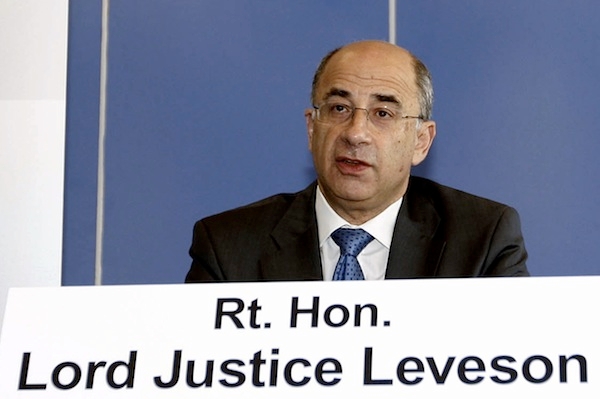Lord Leveson will be publishing his recommendations for the future of press regulation very soon, and those on both sides of the debate are getting nervous. The Hacked Off campaign has a letter in today’s Financial Times opposing plans for continued self-regulation of the industry that is signed by 26 professors in journalism, law and politics. The letter attacks proposals by Lord Hunt and Lord Black for self-regulation which would be underpinned by contracts between the regulator and the publisher which would be enforceable through civil law. It says:
‘We do not believe these proposals to be in the best interests of journalists and journalism. The Hunt-Black scheme is an attempt to perpetuate self-regulation by editors, an approach that has been shown over nearly 60 years to have failed both journalists and newspaper readers – a failure that led to the establishment of the Leveson Inquiry. While the new scheme incorporates some features not seen in the discredited PCC, we believe these changes are insufficient to promote good journalism or to protect the public from the kinds of abuses highlighted so vividly in evidence to Lord Justice Leveson.’
Another member of the campaign, Hugh Grant, speaks out against self-regulation in this week’s Spectator. He writes that the campaign is not made up of ‘muzzlers’ or ‘lefties’, but that it wants the press to ‘obey the law and comply consistently with a fair and decent code of practice’. Grant argues that the press would eventually grow used to a new independent regulator, saying:
‘We don’t know what Leveson will -recommend. But let’s assume he won’t back yet another helping of self-regulation (the so-called Hunt/Black plan). Let’s say he proposes a new regulator, independent both of the industry and of government, and with the minimum statutory underpinning to make it effective. According to a recent YouGov poll, that would be supported by 77 per cent of the UK population. Many of the national newspapers, on the other hand, say it will be the end of freedom of the press. But will it really?
‘It’s similar to how the judiciary, lawyers and doctors are regulated in this country. And none wanted to be regulated, but they’re fine with it now. In terms of regulation it would be nothing in comparison to how Ofcom or the BBC Trust regulate the broadcasting industries, and it’s hard to find a broadcast journalist who complains of being chilled or constrained.’
Our cover story this week underlines some of the problems with Grant’s approach. Alexander Chancellor writes that ‘the very idea of statutory press regulation is antithetical to the idea of press freedom’, while Boris Johnson says the current ‘gutter press’ keeps our politics clean:
‘Government in this country is as clean of financial corruption as anywhere in the world. That is largely thanks to a free and inquisitive media. To rinse the gutters of public life you need a gutter press.’
James points out that ‘nearly every issue’ that Leveson has examined is already covered by the law, arguing that ‘what is needed is not a new law setting up a new regulator but better application of the existing law’. Fraser describes a conversation with an MP who tried to persuade him to discipline a Spectator writer who had annoyed him:
‘It was a preposterous suggestion, but he was limbering up for a post-Leveson era in which the press will have to take note of what people like him think. Soon, such MPs may have control of a regulatory device that can be ratcheted up, inflicting further pain on newspapers already fighting for survival.’
Kirsty Walker, meanwhile, doubts that Lord Leveson himself has a particularly sympathetic attitude towards newspapers, given his reaction to a report in The Times that the TV series The Thick of It planned to satirise his inquiry.
David Cameron will soon face the unenviable task of having to decide whether to accept or reject the Leveson recommendations. As James says in his column this week, the former will ‘earn him the ire of most newspapers and many Tory MPs’, and the latter will land him ‘in an argument with the victims of phone hacking’. It will be one of the big tests of his leadership in the months ahead.







Comments